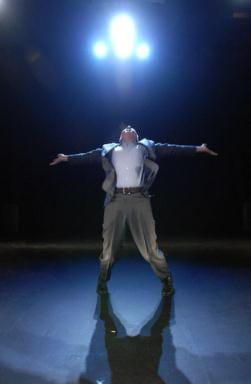
MacIvor says solo performance is a part of who he is.
The last time I interviewed Daniel MacIvor two things were clear: he was giving up the single life and he was giving up solo shows. The celebrated theatre artist had tied the knot, ditched Toronto for Halifax, and folded his production company, da da kamera. Intent on a simpler life (his touring schedule often kept him on the road nine months a year), he settled into domestic bliss and set about writing shows for other people to perform.
Nothing, it turns out, went according to plan. Six years and one messy divorce later, he’s back on the market and back on stage in This Is What Happens Next, his first new solo show since 2003’s Cul-De-Sac.
“I’d convinced myself that solo shows were causing a disconnect in me between my work life and living in the real world,” the Sydney, Nova Scotia, native says. “So off I went into the real world and set about getting myself a real life. The results were disastrous. I don’t know what I was imagining a real life was, but in trying to find one I made some bad decisions and hurt a lot of people.”
His marriage a smouldering wreck and struggling with various addictions, he came to an important realization while enrolled in a 12-step program.
“I recognized that solo performance is just part of who I am,” he says. “It’s something real for me, just as or more real than this strange idea of ‘realness’ I was seeking. That’s when I called [long-time collaborator] Daniel Brooks. The crisis was just behind me, and I felt that if he and I could get together and focus on an idea toward a solo that would help to get my feet back under me.”
Brooks, the director of MacIvor’s past works House, Here Lies Henry and Monster, agreed to help him build one last solo show, but there was a condition: all the stories had to be true. Though the relative “truthiness” of the show’s intersecting plotlines has softened since the first phase of creation, the resulting work still paints a remarkably accurate picture of his protracted breakup.
Warren (a thinly veiled MacIvor) sifts through the ashes of his disastrous relationship while mulling over the designer running shoes and CDs he wants back from his ex. Susan (his divorce lawyer friend) advises and chastises him while she fights her own battle with her alcoholic ex-husband, Mike, over care of their eight-year-old son, Kevin.
Though autobiographical works can tend toward art-as-therapy, MacIvor successfully skirts this potential pitfall, both through the fictional details injected into the story and the relationship he creates with his audience.
“There’s a sort of catharsis for me in the show around ideas of culpability and forgiveness, but that’s an ongoing thing,” he says. “But to say the show was therapy feels indulgent or reductive somehow. It makes it sound like it’s only about me, rather than something I’m sharing with an audience.”


 Why you can trust Xtra
Why you can trust Xtra


